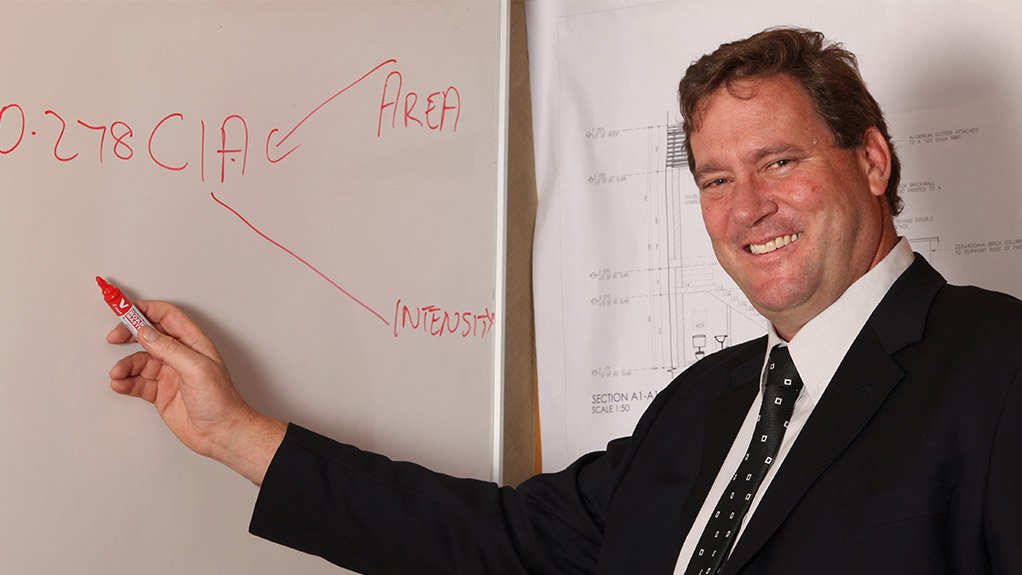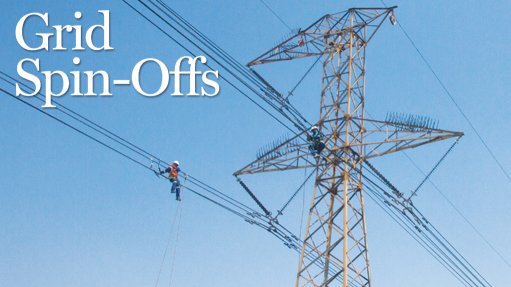Stormwater infrastructure lacking


PETER SHEPHERD South Africa’s big cities have had a severe impact on river systems, with increasing urbanisation compounding the situation
A significant amount of stormwater infrastructure in South Africa is insufficient to handle the country’s rapid urbanisation, according to engineering consulting firm SRK Consulting South Africa.
The ‘age-old’ stormwater problem entails that the runoff from catchment areas that have developed is significantly higher than the natural runoff, as developed areas are less permeable because of their being increasingly covered by concrete and other surfaces, notes SRK Consulting director Peter Shepherd.
“This increase in runoff raises the potential for erosion in the watercourses, hence, the high erosion that is experienced in our urban rivers,” he continues.
Shepherd explains a long-term strategy to control stormwater amid increasing urbanisation is to ensure that there is a buffer between the new developments and the natural rivers. “This creates a space for attenuation facilities and allows for silt or rubbish traps to be installed to collect these unwanted pollutants from rivers. These structures can be built so that, during dry periods, the areas can be used for recreational purposes.”
He adds that the attenuation of flows – slowing down the runoff from an area – must also be done at source. Planning for this could include the construction of water-harvesting tanks to capture the runoff from the roofs; permeable areas at the lowest part of the development, which can store the water and perhaps incorporate the development of a garden; permeable roads to reduce runoff; and on-site attenuation structures.
Existing developed areas, where dams cannot be constructed, will need to use the river systems to attenuate the flows, while ensuring the volumes of stormwater do not exceed the rivers’ capacity.
Shepherd notes that nearly every one of South Africa’s big cities has had a severe impact on river systems, with increasing urbanisation compounding the situation. “A lot of pressure is put on land use, while the control of stormwater seems to be low on the list of priorities.”
The increase in water flow from rainfall is not the only impact that urbanisation has on river systems, he states, adding that leaking sewage and discharged effluent also severely impact on rivers.
“Clearly, the leaks and maintenance of the stormwater systems, as well as good policing from the parks and the water departments, are required.”
The impact on increased runoff often results in flooding and rivers overflowing, which, in many instances, has led to loss of life and property, Shepherd adds.
The rivers that flow through urban areas must be maintained so that the natural vegetation and fauna can continue to keep waters clean. The most severe consequences of encroachment of urbanisation on rivers are erosion and sewage and effluent discharges.
Shepherd states that the record of decision – regulatory authorities’ response to an application for development – must always include a stormwater component as a condition to any urban development.
“Some municipalities are much better at insisting that developers include stormwater controls in their plans, especially the Johannesburg area. The Johannesburg Roads Agency method, which is to ensure that the designs of stormwater systems are included in township applications such that stormwater increases expected from urban development are attenuated to natural conditions, for example, is a good indication of how developments are approved from a stormwater perspective.”
Further, a shortage of professional engineers at municipalities is a real challenge, he says. “We need extensive training to develop the municipal engineering skills required for urban areas. We must address this actively, rather than continue to use it as a reason for stormwater problems.”
Expertise from the private sector can be vital to increase the levels of training and secondment of graduate engineers, notes Shepherd, adding that this is also a valuable way of developing newly qualified young engineers.
Article Enquiry
Email Article
Save Article
Feedback
To advertise email advertising@creamermedia.co.za or click here
Press Office
Announcements
What's On
Subscribe to improve your user experience...
Option 1 (equivalent of R125 a month):
Receive a weekly copy of Creamer Media's Engineering News & Mining Weekly magazine
(print copy for those in South Africa and e-magazine for those outside of South Africa)
Receive daily email newsletters
Access to full search results
Access archive of magazine back copies
Access to Projects in Progress
Access to ONE Research Report of your choice in PDF format
Option 2 (equivalent of R375 a month):
All benefits from Option 1
PLUS
Access to Creamer Media's Research Channel Africa for ALL Research Reports, in PDF format, on various industrial and mining sectors
including Electricity; Water; Energy Transition; Hydrogen; Roads, Rail and Ports; Coal; Gold; Platinum; Battery Metals; etc.
Already a subscriber?
Forgotten your password?
Receive weekly copy of Creamer Media's Engineering News & Mining Weekly magazine (print copy for those in South Africa and e-magazine for those outside of South Africa)
➕
Recieve daily email newsletters
➕
Access to full search results
➕
Access archive of magazine back copies
➕
Access to Projects in Progress
➕
Access to ONE Research Report of your choice in PDF format
RESEARCH CHANNEL AFRICA
R4500 (equivalent of R375 a month)
SUBSCRIBEAll benefits from Option 1
➕
Access to Creamer Media's Research Channel Africa for ALL Research Reports on various industrial and mining sectors, in PDF format, including on:
Electricity
➕
Water
➕
Energy Transition
➕
Hydrogen
➕
Roads, Rail and Ports
➕
Coal
➕
Gold
➕
Platinum
➕
Battery Metals
➕
etc.
Receive all benefits from Option 1 or Option 2 delivered to numerous people at your company
➕
Multiple User names and Passwords for simultaneous log-ins
➕
Intranet integration access to all in your organisation



















